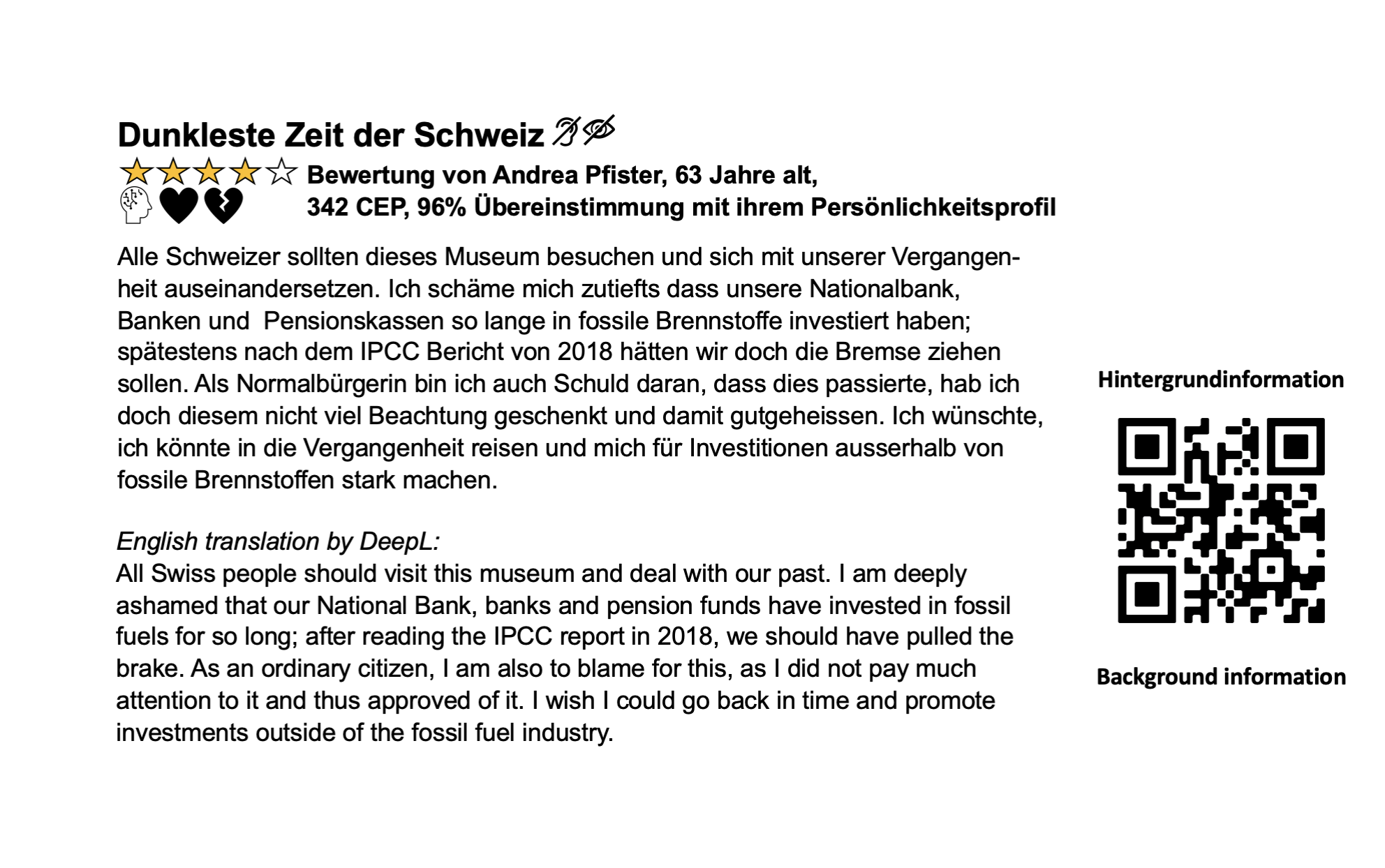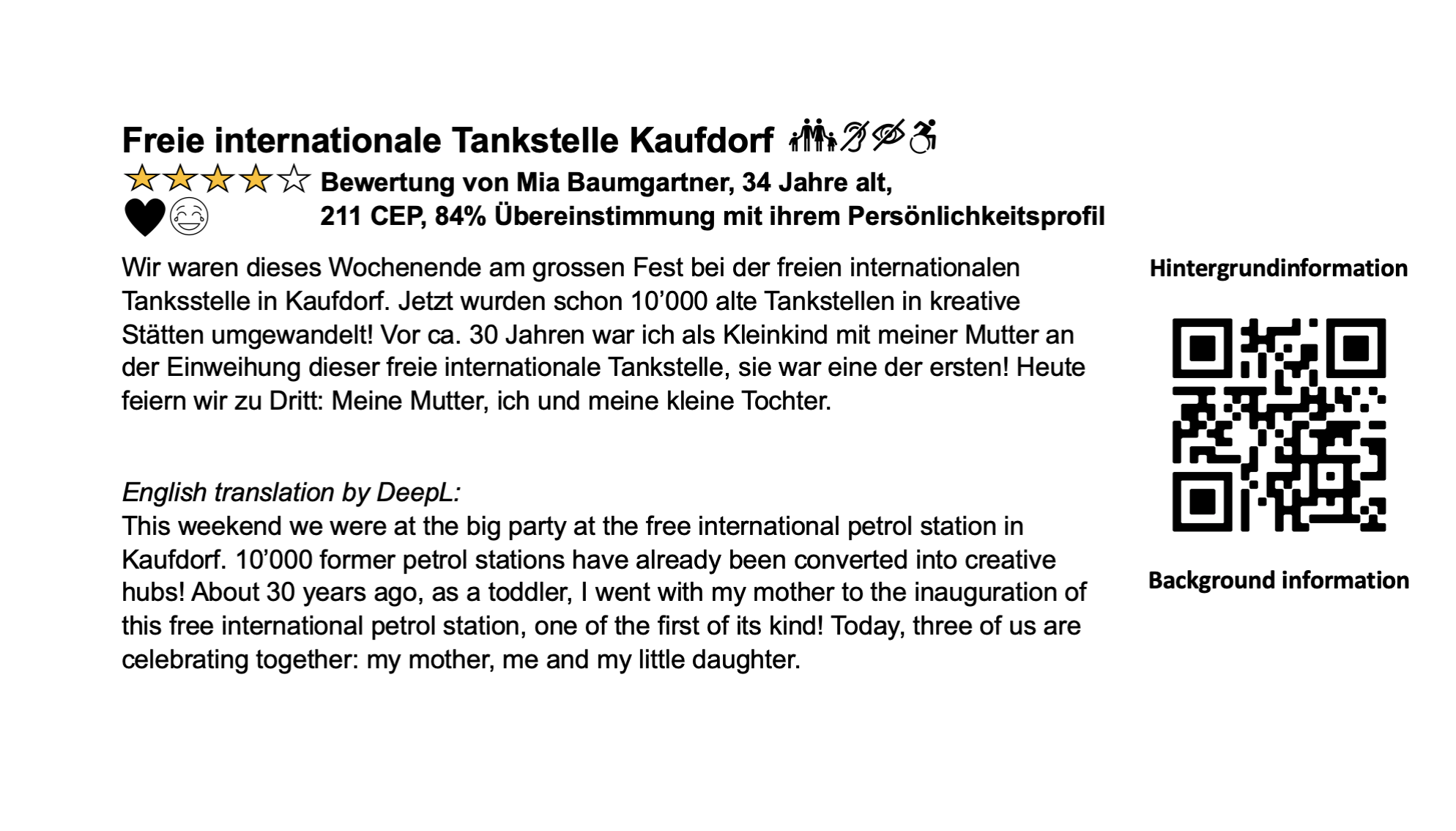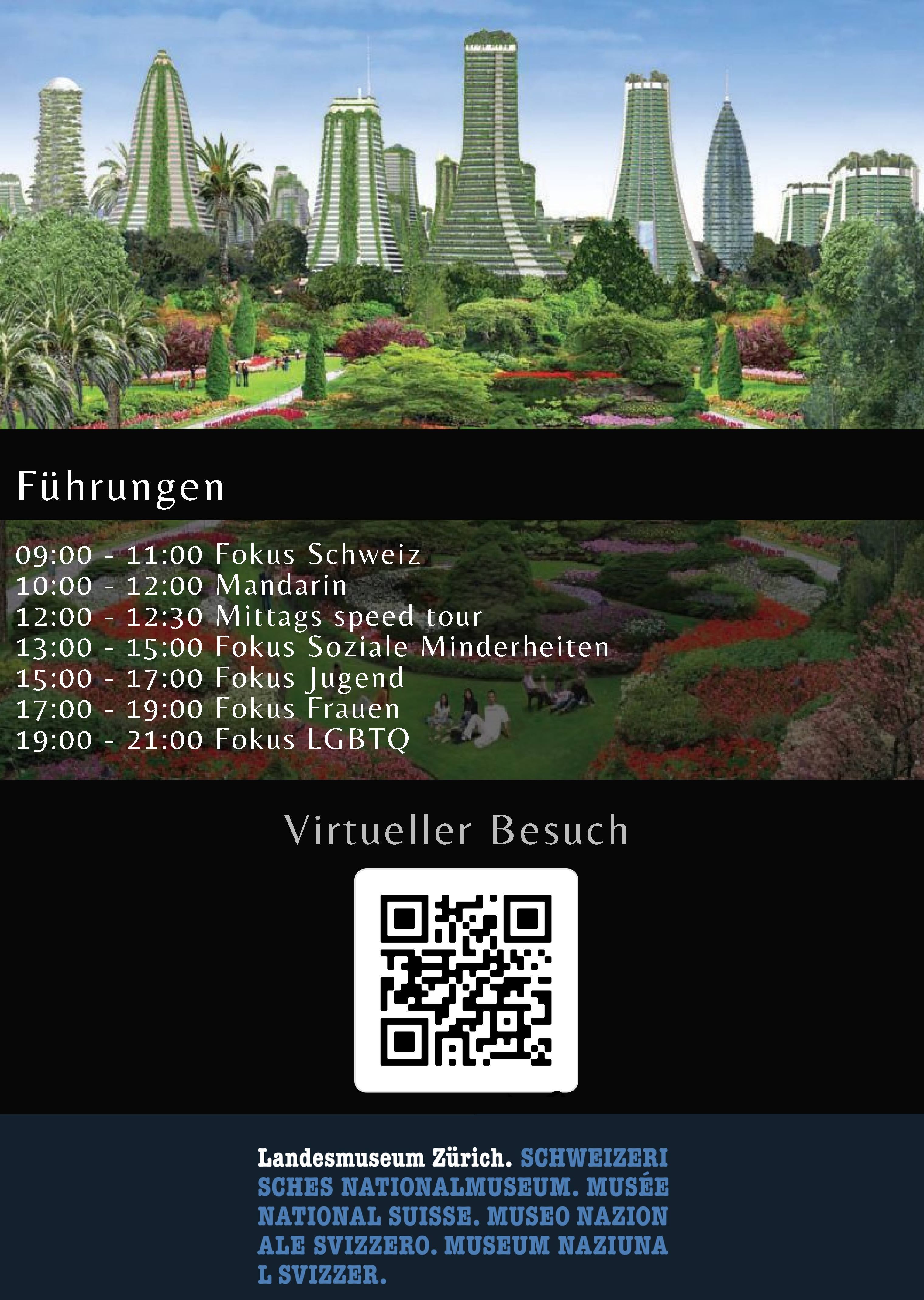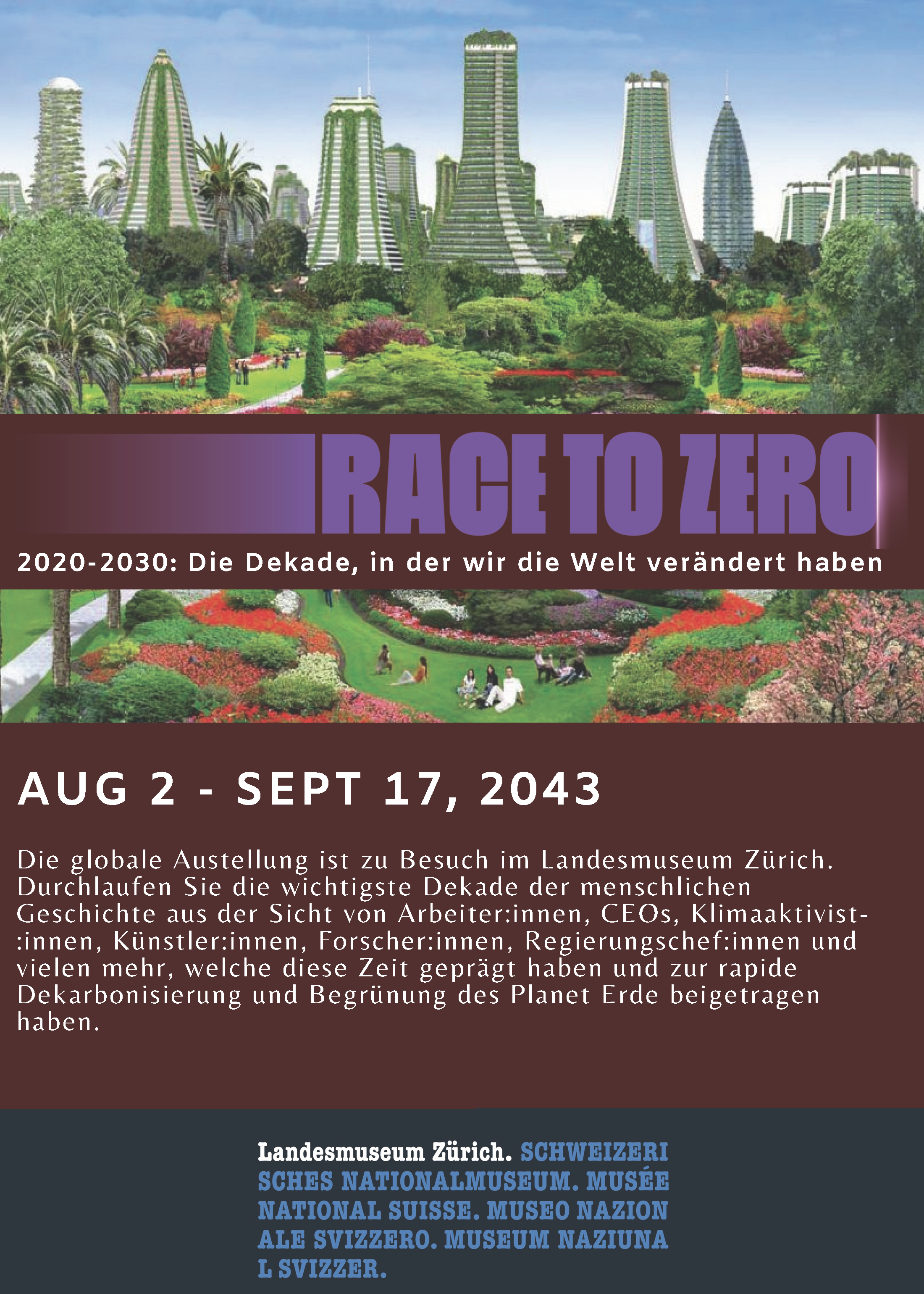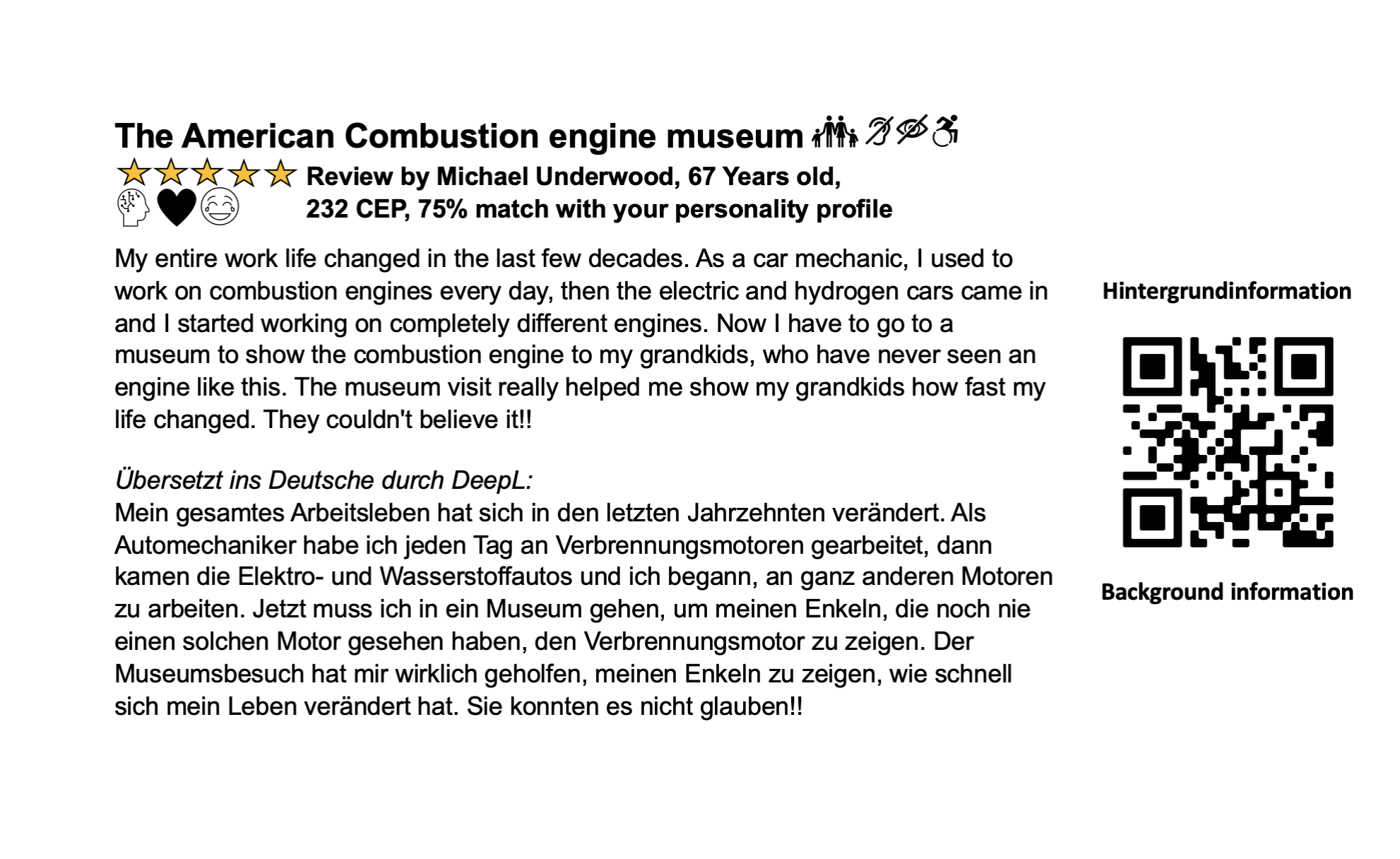Franziska Elmer
Dr. Franziska Elmer studied environmental sciences at ETH Zurich and completed her PhD in marine biology at the Victoria University of Wellington in New Zealand. Since then she has spent 3 years in the Caribbean; as a lecturer in marine ecology she dove with her students almost daily to show them how coral reefs work. Her research focused on coral recruitment, stony coral tissue loss disease and the impact of Sargassum beaching events on ecosystems and local communities. Since January, she has been on a climate change sabbatical in which she volunteers for various projects that help to solve this crisis.
Museum der Zukunft
Manche Dinge, welche für uns heute alltäglich sind, werden in 2050 nur noch in Museum zu finden sein. Diese Eintrittskarten, Postkarten und Flyer sind Artefakte der Zukunft. Anstatt Eintrittspreise sind Cultural Education Points (CEP) auf den Tickets abgedruckt. Die Museen der Zukunft sind gratis, und man kann mit einem Besuch Cultural Education Points sammeln. Diese Punkte, welche weltweit eingeführt wurden, sind ein Statussymbol, sie helfen bei der Jobsuche und in der Liebe. Wie heute, spielen auch in der Zukunft Bewertungen von Besuchern eine grosse Rolle, wenn man einen Museumsbesuch plant. Ihr könnt zu jedem Museum eine Bewertung lesen. Neu in der Zukunft, seht ihr wie viel ihr mit der Person, welche die Bewertung geschreiben hat, gemeinsam habt. Neben einer Sternenbewertung gibt jede Person auch an ob das Museum:
- Den Geist anregt
- Das Herz berührt
- Trauriges thematisiert
- Zum Lachen bringt
In 2050 sind alle Museen rollstullgängig und die Information wird für Blinde und Gehörlose zugänglich gemacht. Trotzdem hat es bei jeder Bewertung Informationen zur Zugänglichkeit, da es manchmal Elemente gibt die man nicht 100% zugänglich machen kann. Wenn man mit dem Rollstuhl den Lift nimmt, verpasst man die prunken Verzierungen auf der Wendeltreppe, und eine gesprochene Beschreibung der verschiedenen Lungen vermittelt nicht den gleichen Eindruck wie wenn man sie betrachten kann.
Ich hoffe, dass wir in den nächsten 10-20 Jahren die schnellste Transformation, welche die Menschheit je gesehen hat, durchleben und mitgestalten werden. Nur so können wir die schlimmsten Folgen des Klimawandelns verhindern. Diese interessanten Periode der Transformation wird dann natürlich in vielen Museen der Zukunft anzutreffen sein.
Sind Sie von diesen Museen inspiriert und wollen Sie, dass diese Wirklichkeit werden? Die Transformationen, die hinter diesen Museen stecken, sind alle technisch und finanziell machbar, das einzige was fehlt ist ambitioniertes Denken in der Politik, Industrie und bei den einzelnen Menschen. So rasant wie sich unser Leben durch Smartphones verändert hat, können sich auch andere Aspekte des Lebens verändern. Denken Sie darum ambitioniert über unsere Zukunft nach, und trauen Sie sich Vorreiter*in zu sein. Nur mit dem Engagement aller, inklusive Ihnen, schaffen wir diese enorme Aufgabe.
Eines der Museen zeigt eine düstere Schweizer Vergangheit. Es thematisiert die enormen Investments in fossile Industrie, welche unsere Schweizer Finanzinstitute heute tätigen. Auf dem Ticket kannst du die Zeitspanne lesen in der solche Investitionen getätigt wurden, von der Inkrafttrettung des Pariser Abkommens bis Jahre dannach. Diese Zukunft ist noch nicht in Stein geschrieben und das Endjahr diese Zeitspanne kann nach vorne verschoben werden. Setzte dich aktiv dafür ein, das unsere Schweizer Banken und Pensionskassen sowie die Nationalbank ihre Investitionen aus dieser Branche entfernen und nicht mehr einen Erwärmung von +4 – 6 C finanzieren.
Visit to the museums of the future
Some things that are ordinary for us today will only be found in museums in 2050. These admission tickets, postcards and flyer are artefacts from the future. Instead of entrance fees, Cultural Education Points (CEP) are printed on the tickets. The museums of the future are free, and you can collect Cultural Education Points with each visit. These points, which have been introduced worldwide, are a status symbol, they are important for finding a job and a partner. Similar to today, visitor ratings will continue to play an important role in the future. You can read a rating for each museum. In the future, you will be able to see how much you have in common with the person who wrote the review. Besides a star rating, each person also indicates whether the museum:
- Stimulates the mind
- Touches the heart
- Covers a sad topic
- Makes you laugh
In 2050, all museums will be wheelchair accessible and information will be made available to the blind and deaf. Nevertheless, there is information about accessibility displayed for each museum, because sometimes there are elements that cannot be made 100% accessible. If you take the elevator in a wheelchair, you miss the magnificent decorations on the spiral staircase, and a spoken description of the different lungs does not give the same impression as if you could look at them with your own eyes.
I hope that in the next 10-20 years we will live through and shape the fastest transformation that humanity has ever seen. Only then will we be able to prevent the worst consequences of climate change. Of course, this interesting time period of transformation will give rise to many museums in the future.
Are you inspired by these museums and do you want them to become reality? The transformations thematized in these museums are all technically and financially feasible. The only missing link is ambitious thinking in politics, industry and individuals. Recently, our way of life was rapidly changed by the introduction of smartphones. In similar ways, other aspects of our lives can also change. I urge you to think ambitiously about our future and dare to be a pioneer. Only with the commitment of everyone, including you, can we achieve the enormous goal of rapid decarbonization.
One of the museums shows a dark Swiss past. It deals with the enormous investments in fossil industries that our Swiss financial institutions are making today. On the ticket you can read the time span in which such investments were made, from the adoption of the Paris Agreement until years later. This future is also not yet written and the end year of this period can be moved forward. Take active steps to ensure that our Swiss banks and pension funds and the National Bank remove their investments from this sector and no longer finance a warming of +4 – 6 C.


